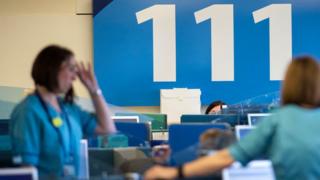Coronavirus in Wales: Public should only call NHS 111 if 'can't cope'
 Image copyright
Getty Images
Image copyright
Getty Images
People who think they may have contracted the coronavirus no longer need to call NHS 111 in Wales.
Public Health Wales (PHW) is advising those with a fever or a new persistent cough to self-isolate for seven days.
It said those people should not to attend a GP surgery, pharmacy or hospital and only contact NHS 111 if they "cannot cope" with the symptoms at home or their condition worsens.
The new advice came as the number of confirmed cases in Wales rose to 94.
The update on Sunday saw 34 new confirmed cases, the biggest daily rise so far.
However, the true number of cases is likely to be higher.
"People no longer need to contact NHS 111 if they think they may have contracted novel coronavirus (Covid-19)," said Giri Shankar, incident director for the outbreak response at PHW.
"Instead, anyone who has a high temperature or a new continuous cough should stay at home for seven days.
"They should only contact NHS 111 if they feel they cannot cope with their symptoms at home, their condition gets worse, or their symptoms do not get better after seven days."
The public has been urged to play a "crucial role in containing the spread" of the virus by health experts.
Chris Williams said transmission could be reduced if people self-isolated if they had any symptoms and washed their hands.
Meanwhile three drive-through community testing units (CTUs) in north Wales have been closed.
Betsi Cadwaladr University Health Board said the centres at Rossett near Wrexham, Llanfairfechan in Conwy and Porthmadog, Gwynedd, are no longer operating.
"This is part of a national decision that has been taken to end routine community testing as the UK moves into the next phase of the response to slow down the spread of Coronavirus," said a spokesman.
Sunday's update included the first cases in Torfaen, Ceredigion, the Vale of Glamorgan and Rhondda Cynon Taf.
Denbighshire, Merthyr Tydfil and Gwynedd do not have a recorded case though PHW said that the residential area of eight of the confirmed cases was still being looked into.
Calls for testing
Plaid Cymru has called on the Welsh Government to continue routine testing in the general population to get a fuller picture of the spread of the virus.
"It is vital that we grow public confidence by providing as much clarity as possible over the outbreak," said Plaid leader Adam Price.
"The World Health Organization's guidance is clear - you can't fight a virus if you don't know where it is."
In a statement, the Welsh Government said it will "focus on those with severe symptoms" to give the health service "the greater capacity it needs" to test and care for the most vulnerable.
The official numbers of confirmed cases from now on will be far fewer than the actual number of cases in our communities.
In this "delay" phase public health officials are concentrating on testing those sick enough to need hospital treatment, rather than individuals at home.
This is because the assumption now is that if you are sick with cold or flu-like symptoms you may well have coronavirus.
That means you should self-isolate as a matter of course and not need a positive test to justify that.
So the confirmed numbers we see each day are likely to be the tip of a growing iceberg.
The increasing number of cases has prompted some universities in Wales to announce plans to stop face-to-face teaching.
Bangor University has said all lectures have been cancelled with immediate effect, and will move online next week.
Cardiff University and Swansea University have said they will be moving to online teaching over the coming week.
University of Wales Trinity St David said it was also suspending campus classroom lessons on Monday.
But the Welsh Government has said closing schools at this stage "would do little to protect those most vulnerable such as grandparents who may then become childcare providers".
It follows calls from members of the Welsh Youth Parliament to close all educational institutions in Wales.
"Now is the time to ensure that all schools, colleges and universities are closed, that young people are kept from mass gathering environments such as schools," said a letter signed by 20 of the 60 members of the group - all aged between 11 and 18.